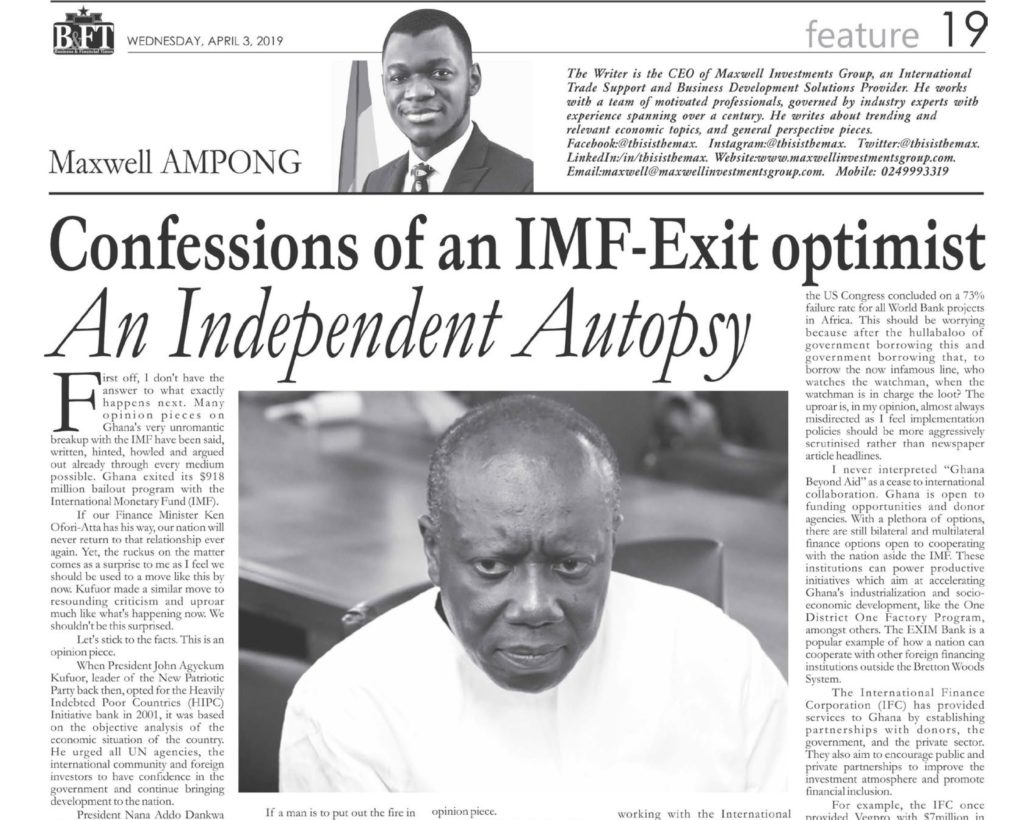Any alternatives to the International Monetary Fund (IMF) Africa should be looking at?
The International Monetary Fund (IMF) was established to ensure global economic stability. This is done by providing financial assistance to countries facing economic difficulties. In recent years, the IMF has been involved in providing bailouts to several African countries that are struggling with their economies. The IMF bailout comes with certain conditions that some believe is the best solution for Africa’s economic challenges. Others, however, argue that IMF bailouts come with conditions that are often unrealistic and difficult to achieve, especially for economically struggling countries. Moreover, the IMF has been criticized for its involvement in Africa’s economic affairs, with some going as far as accusing the organisation of being responsible for Africa’s economic problems. On the 3rd of April 2019, I lauded the Ghanaian Government for taking an anti-aid stance and opting out of an IMF program back then. Three years later, we’re back at the IMF for a bailout. I know I know… COVID and the Russian-Ukrainian War and post-COVID (if we’re really at the ‘post’ side of COVID) and it’s a new world with new normals and the world is going through a brutal shift etc. but I still have to ask: Is the IMF bailout the best solution for Africa’s economic challenges? Are there alternatives we should be looking at, from a continental perspective? This is an opinion piece. Let’s view the following below as a brainstorming session; the answers of the world much less likely resides in one person’s head. Why do African countries resort to the IMF when the debt to GDP ratios reach a particular mark? It is no secret that many African countries are struggling with high debt levels. In fact, according to the World Bank, the average debt to GDP ratio for low-income countries was 52% in 2017, while it was even higher for middle-income countries at 58%. For some countries, the situation is even direr. So why do African countries resort to the IMF when the debt to GDP ratios reach a particular mark? There are several reasons. First, many African countries rely heavily on external financing. This means they borrow money from other countries or international organisations like the World Bank. As a result, these countries are more vulnerable to changes in global interest rates. For instance, when interest rates rise, it becomes more expensive for these countries to service their debt. This can lead to a debt spiral, where the country is forced to take out even more loans to pay off its existing debt. (“GHANA: IMF Bailout Sought”, 2014) Second, African countries often have weak domestic financial markets. This makes it difficult for them to raise money through bond issuance or other means. As a result, they rely more on external financing, which can be more expensive and difficult to obtain. Third, African countries often have low levels of reserves. This makes it difficult to weather economic shocks, such as a sudden drop in commodity prices. When these shocks occur, the country may need to turn to the IMF for financing. Fourth, many African countries have weak institutions. This makes it challenging to implement sound economic policies and enforce contracts. As a result, these countries are more likely to experience economic crises, which can increase debt levels. (“GHANA: No IMF Bailout”, 2018) Finally, African countries often have large populations. This means there is a greater need for social spending, such as education and health care. However, these can also put a strain on government finances. In summary, there are many reasons why African countries resort to the IMF when their debt to GDP ratios reach a particular mark. This is often because these countries rely heavily on external financing, have weak domestic financial markets, low levels of reserves, and weak institutions. (International Monetary Fund, 2006) As a result, they are more likely to experience economic shocks that can increase debt levels. How will an IMF bailout help to improve Africa’s economic conditions? The international financial crisis that began in 2007 quickly spread around the world, culminating in the collapse of Lehman Brothers in September 2008. This had a devastating effect on global economies, with Africa being particularly hard hit. In response, the G20 countries committed to providing $1.1 trillion to support the International Monetary Fund (IMF) and other international financial institutions. This was intended to help them provide emergency funding to countries affected by the crisis. However, it soon became apparent that this would not be enough to stabilize the global economy. In November 2008, at the G20 summit in Washington DC, it was agreed that a further $250 billion would be made available to the IMF. This money would be used to create a new facility, known as the Poverty Reduction and Growth Facility (PRGF). The PRGF was designed to help low-income countries (LICs) cope with the effects of the financial crisis. It provided them with access to cheap financing, which they could use to support their economies. In addition, the IMF committed to providing technical assistance and policy advice to LICs. (“AFRICA: World Bank Bailout Package”, 2009) The PRGF helped many LICs weather the storm in the immediate aftermath of the financial crisis. However, it did not address the underlying problems that had led to the crisis in the first place. For this reason, the G20 countries agreed to provide a further $430 billion to the IMF in April 2009. This money was used to create a new facility known as the Flexible Credit Line (FCL). The FCL was designed to provide short-term financing to countries with sound economic policies. It was intended to help them deal with unexpected shocks, such as a sudden loss of export revenue. To be eligible for the FCL, countries had to meet strict criteria for their macroeconomic policies. So far, the FCL has been used by Mexico, Poland, and South Korea. All three countries have experienced significant economic challenges in recent years. However, they have managed to avoid a full-blown crisis thanks to the support of the FCL. While
Any alternatives to the International Monetary Fund (IMF) Africa should be looking at? Read More »




